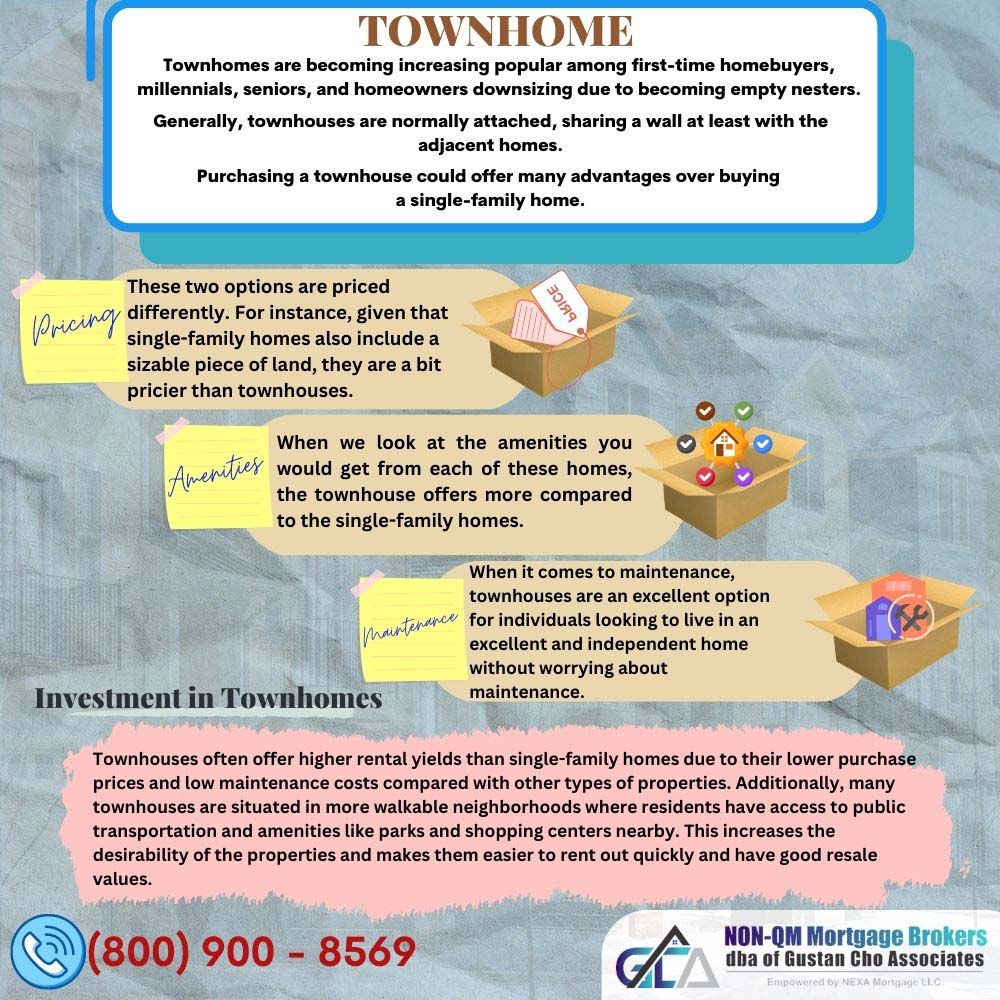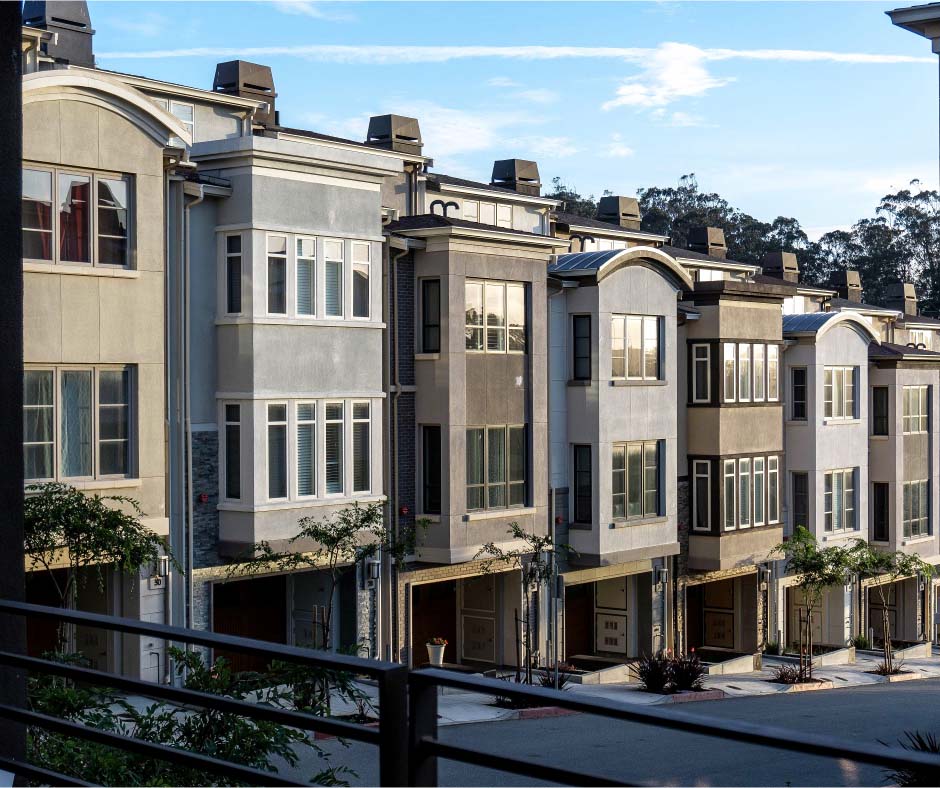Townhomes
In this blog, we will cover buying townhomes versus single-family homes or other types of homes. Buying a townhomes versus a single-family home can benefit homeowners who want limited maintenance. Townhomes come with the townhome homeowners association. The townhome homeowners association collects an HOA fee.
The homeowners association dues goes into the HOA escrow account to maintain the common areas of the townhome housing complex. Townhomes are becoming increasing popular among first-time homebuyers, millennials, seniors, and homeowners downsizing due to becoming empty nesters. In the following paragraphs, we will cover owning a townhouse and its benefits.
Different Types of Homes For Homebuyers and Investors
Whether you’re buying your first home, looking to upgrade, or seeking an investment opportunity, you might be considering a townhouse. Purchasing a townhouse could offer many advantages over buying a single-family home. Understanding the differences between townhouses and single-family homes can help you decide which is right for you. In this article, we will explore the differences between purchasing a townhouse and single-family residence, so that you can make the best decision for your needs.
What Are Townhomes?
Townhouses have become a popular urban housing choice for many people over the past few years. A townhouse is a multi-level dwelling that shares at least one wall with another residence. In simple terms, a townhouse is a multi-floor residential home consisting of its own entrance, kitchen, and bathroom space.
Townhouses are typically traditional in design and may be found in a town or city center, but can also be located in suburban neighborhoods. Townhouses provide residents with privacy and security without the maintenance tasks of single-family homes. You may also find that you have your own small front lawn and a backyard.
What Are Single-Family Homes
A single-family home is one of the most popular types of housing available in the United States. It is a residential property built and functions independently and in complete isolation from other houses – so it doesn’t share walls with other buildings. It is a structure that is designed to house only one family, typically with multiple floors and a private backyard or outdoor area. Single-family homes can come in a variety of sizes and styles, from quaint cottages to sprawling estates. They are usually situated on their own parcel of land, and they can be found in both urban and rural settings.

How Are Townhomes and Single-Family Homes Different
Perhaps the most obvious difference between both types of homes is their structures. Generally, as we’ve already mentioned, townhouses are normally attached, sharing a wall at least with the adjacent homes. Single-family homes, on the other hand, are freestanding and typically sit on a specific plot of land, both of which belong to the homeowner. The other key difference between both types of homes is the location, with townhouses normally found in urban areas, while single-family homes are mostly found in rural areas.
Comparing Sense of Community on Single-Family Home versus Townhomes
We also have to mention the sense of community that each type of home offers. For single-family homes, you find that since there are isolated, occupants are more likely to keep to themselves. In contrast, townhouses tend to invite a sense of togetherness among the occupants and neighbors.
We also have to consider the modernity of these homes, with townhouses being more modern and energy-efficient in terms of their designs compared to single-family homes. You will find amazing garages, extensive storage spaces, exquisite master bedrooms, granite countertops, and high-end appliances in townhouses – things you are unlikely to find in single-family homes.
Comparing Buying Townhouse Versus Single-Family Homes
Other differences on buying townhomes versus single-family homes include prices, amenities, maintenance, size of homes, and property taxes and insurance. Many people buy townhomes as starter homes. Townhomes are ideal for first-time homebuyers. Townhomes are ideal for homeowners who travel and retirees.
Retirees prefer townhomes versus single-family homes because of less maintenance and security. Townhomes are normally attached to other townhomes so your neighbor can watch over your place when vacant. In general prices of townhomes are much less than single-family homes. However, there are luxury townhomes that can cost over a million dollars.
Comparing Price of Townhomes Versus Single-Family Homes
Price – these two options are priced differently. For instance, given that single-family homes also include a sizable piece of land, they are a bit pricier than townhouses. Location has to do a lot with the price of a house. Lots in high priced areas can run several hundred thousand dollars. Land prices in rural areas may not be so expensive. Small city lots can run $400,000 or higher.
In many instances, homebuyers may purchase a tear down or fixer upper and tear down the house and build new. All this adds to the price of the house. Also, since some of the single-family homes may be located in safe and accessible neighborhoods, the price may be much higher.
Amenities of Owning a Townhouse
Amenities – when we look at the amenities you would get from each of these homes, the townhouse offers more compared to the single-family homes. You will find things like a shared pool, fitness centers, or even maintenance personnel. Also, townhouses are mostly located in close proximity to public transportation, restaurants, and shopping centers. As for single-family homes, getting one near a town where such amenities are could be very costly, meaning that most people buy these homes in rural areas, where you will need to travel a few miles to get to towns.
Benefits of Limited Maintenance of Owning a Townhouse
Maintenance – when it comes to maintenance, townhouses are an excellent option for individuals looking to live in an excellent and independent home without worrying about maintenance. The responsibility of maintaining townhouses falls under the property agencies in charge. On the other hand, single-family homes offer more privacy, yes, but it also requires you, as the owner, to carry out the maintenance work.
Size of Townhouse Versus Single-Family Homes
Size – talking of the size, townhouses are built as detached buildings that are side by side but in a single lot or as a row of attached buildings. Usually, there are two units, each with its own staircase and entrance. With that said, most of these homes have limited spaces compared to single-family homes that come with a large living area that accommodates household members, including parents and children, not to forget that most of the homes sit on a sizeable piece of land.
What’s a Better Investment Between Townhouse and Single-Family Homes
In determining the house to get between a townhouse and a single-family home, you need to determine the purpose of your investment in the first place. If you are looking to buy from an investment standpoint, both of these options offer something different.
Investment in Single-Family Homes
Single-family homes provide investors with more autonomy when it comes to making improvements and managing tenants; an investor will generally have full control over their single-family home property, including setting rent prices and deciding who they want as tenants. Additionally, since single-family homes are usually situated in residential areas, they often offer investors a steady stream of rental income over long periods of time.
In addition, the investor usually benefits from higher appreciation rates as well as better resale value compared to a townhouse, given that these homes offer more freedom, independence, and a bigger space that’s enough to host family gatherings.
Investment in Townhomes
On the other hand, townhouses involve less maintenance costs due to shared common areas such as yards, gardens, and driveways being taken care of by the homeowners’ association fees paid by all residents in the area; making them more affordable for those wishing to invest in property on a budget.
As a result, townhouses often offer higher rental yields than single-family homes due to their lower purchase prices and low maintenance costs compared with other types of properties. Additionally, many townhouses are situated in more walkable neighborhoods where residents have access to public transportation and amenities like parks and shopping centers nearby. This increases the desirability of the properties and makes them easier to rent out quickly and have good resale values.
Maintenance of Owning Townhomes Versus Single Family Homes
From a family standpoint, townhouses can have less upkeep since you won’t have to worry about mowing a lawn or shoveling snow in the winter months. They often come with amenities like pools, clubhouses, and gyms which make them ideal for those looking for a community, or more than just the basics of home ownership.
On the downside, townhouses usually have shared walls with other units which can lead to noise issues from neighbors. They may also come with restrictions on what modifications you can make to the property and some homeowners associations might require regular fees for taking care of communal amenities.
Privacy of Owning Single-Family Home Versus a Townhouse
A single-family home, on the contrary, offers more space than a townhouse and provides increased privacy for occupants. Single-family homes typically have larger yards, allowing children plenty of room to play outdoors safely. Additionally, you may even have enough space to customize your yard with pools, decks and patios – perfect for barbecues or just relaxing on warm summer days! Single-family homes are ideal for those who want a sense of privacy, security, and stability.
Qualifying For a Mortgage on a Single-Family Home Versus a Townhouse
For those looking for financial gains, single-family homes can be an excellent investment opportunity because of the freedom for decoration and personalization as well as their potential appreciation value over time. It’s also great for growing families, because there’s plenty of room to add bedrooms, bathrooms, or even an extra living room or an outdoor play area if needed. For those who are looking for a quieter lifestyle away from the disruption of neighbors and traffic, a single-family home could be the perfect fit.
Townhomes For First-Time Homebuyers
Townhouses are the perfect choice for those who seek a combination of convenience and affordability. Offering more space than an apartment but less responsibility than a single-family home, townhouses offer a unique blend of modern amenities and traditional charm that make them ideal for anyone looking to upgrade their lifestyle. From spacious bedrooms to expansive outdoor areas, these multi-level dwellings offer something for everyone.
What Type of Home Is Best For Me?
In conclusion, both townhouses and single-family homes have their advantages and disadvantages. Ultimately, the decision to buy a townhouse or single-family home depends on one’s lifestyle and financial situation. Townhouses are generally less expensive and require less maintenance, while single-family homes typically offer more privacy, space, and potential for customization. Before making any decisions about where to live, it is essential to do thorough research and talk to an experienced real estate agent who can help guide you in the right direction.
Townhomes That Are Considered Condos
One thing to realize is that many townhome communities consider townhomes as condominiums. Even though each unit are free standing but attached to one another like a duplex, some townhomes are called condominium homes. When it comes to condominium townhomes, you need to get the townhouse homeowner association property manager complete a condominium questionnaire.
The townhouse questionnaire is provided by the mortgage lender and completed, dated, and signed by the property manager. The townhouse in a condominium townhouse complex needs to be warrantable versus non-warrantable. It will state on the townhouse questionnaire from the townhouse homeowners association manager whether the complex is a warrantable or non-warrantable townhouse complex.

